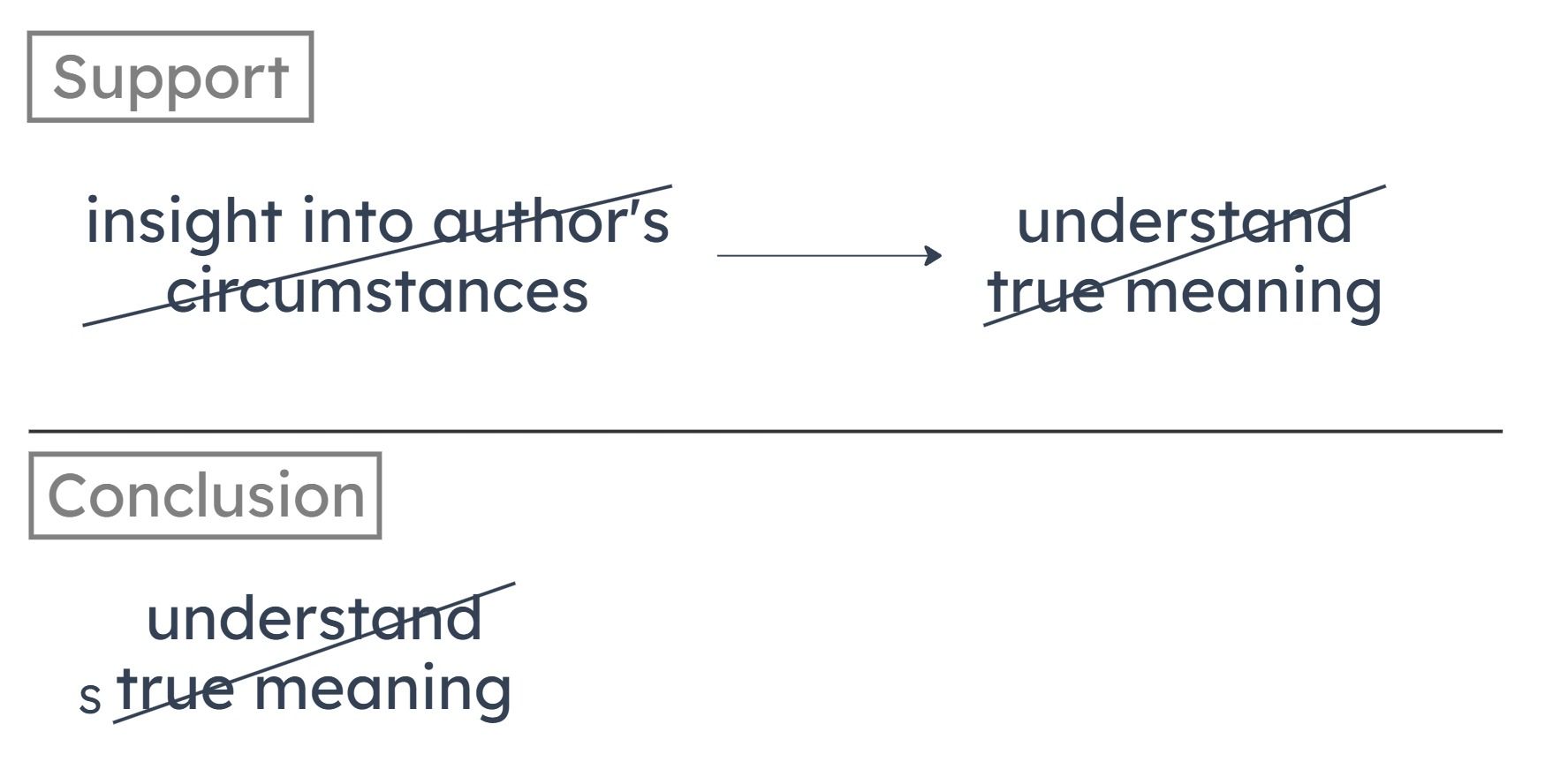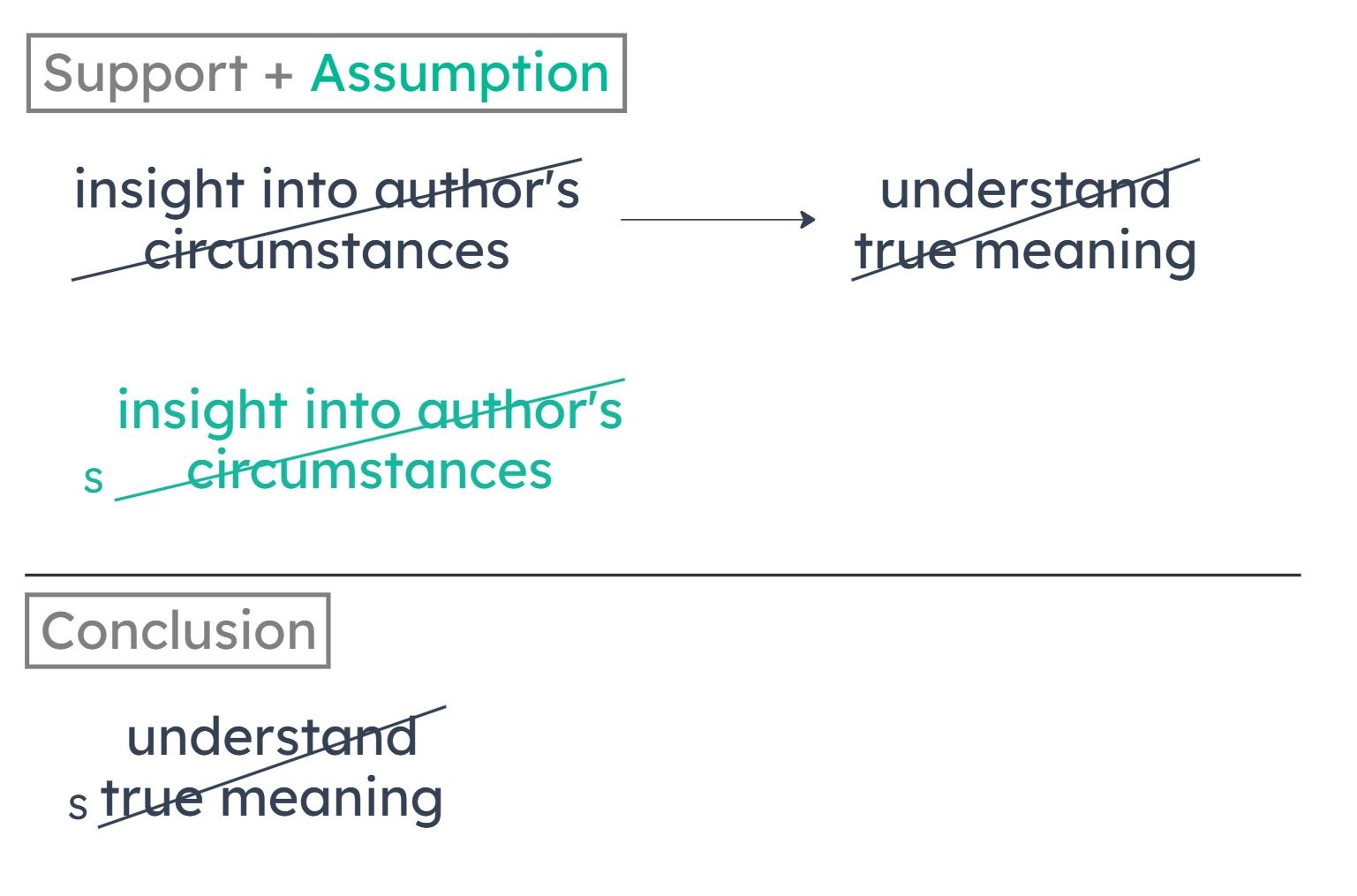Music critic: But rap appeals to tradition by using bits of older songs. Besides, the themes and styles of rap have developed into a tradition. And successful rap musicians do not perform purely idiosyncratically but conform their work to the preferences of the public.
Summarize Argument: Counter-Position
The music critic implicitly concludes that rap is not as individualist and nontraditional as the music professor claims. She supports this by noting that rap uses elements of older songs, rap has become a tradition itself, and that great rappers align their work with public preferences, rather than being purely unique.
Describe Method of Reasoning
The music critic undermines the music professor’s conclusion that rap is individualist and nontraditional. She does this by presenting additional claims about rap music— that it uses bits of older songs, has become a tradition, and often aligns with public preferences— that the music professor overlooked.
A
challenges it by offering evidence against one of the stated premises on which its conclusion concerning rap music is based
The music critic does challenge the professor’s argument, but she doesn’t do so by offering evidence against any of his premises. Instead, she offers additional claims about rap music that undermine the professor’s conclusion.
B
challenges its conclusion concerning rap music by offering certain additional observations that the music professor does not take into account in his argument
The music critic offers observations— that rap uses bits of older songs and has become a tradition, and that rappers align their work with public preferences— that the professor overlooked. These points challenge his conclusion that rap is nontraditional and individualistic.
C
challenges the grounds on which the music professor generalizes from the particular context of rap music to the broader context of musical tradition and individuality
The professor doesn’t generalize from rap to the broader context musical tradition and individuality. So, the critic also doesn’t challenge him on this front.
D
challenges it by offering an alternative explanation of phenomena that the music professor cites as evidence for his thesis about rap music
The music critic does challenge the professor’s argument, but she doesn’t do so by offering any alternative explanations of his evidence. Instead, she presents additional evidence that undermines his conclusion.
E
challenges each of a group of claims about tradition and individuality in music that the music professor gives as evidence in his argument
The music critic doesn’t challenge each of the professor’s claims. Instead, she challenges his conclusion by offering additional claims of her own.
Summary
The speaker concludes that Smith doesn’t understand the true meaning of her own words, because according to Smith (who we are allowed to assume is correct), understanding true meaning requires insight into social circumstance.


Missing Connection
The conclusion is Smith’s failure to understand, and we have a conditional describing what is necessary to understand. We need to know that Smith has failed this requirement to conclude that she does not understand.
A
Insight into the intended meaning of an author’s work is not as important as insight into its true meaning.
We are not trying to compare importance of anything. We need airtight support that Smith doesn’t understand her own words. Also, we cannot use information about intended meaning to validly support any conclusion here.
B
Smith lacks insight into her own social circumstances.
If this is true, then Smith has failed the requirement for true understanding. We can validly draw the conclusion that she doesn’t truly understand her own words.


C
There is just one meaning that Smith intends her work to have.
Having more than one meaning doesn’t affect this argument for better or worse. We are trying to conclude that Smith doesn’t understand her own words.
D
Smith’s theory about the relation of social circumstances to the understanding of meaning lacks insight.
This is attempting to undermine Smith’s theory, but the speaker’s argument actually hinges on Smith being correct. He has also given us permission to treat it as true, i.e. “Thus, if she is right...”
E
The intended meaning of an author’s work is not always good evidence of its true meaning.
We cannot use this to validly draw any kind of conclusion. Like (A), this answer is introducing intended meaning, but there is no information about intended meaning in the argument.
Summarize Argument: Phenomenon-Hypothesis
The author hypothesizes that snoring can damage the throat of the snorer. This is because of a study showing that throat surgery patients who snored frequently were more likely to have throat abnormalities than patients who didn’t snore frequently.
Notable Assumptions
Based on a mere correlation between snoring and throat abnormalities, the author assumes that snoring causes throat abnormalities. This means the author doesn’t believe the relationship is the reverse (i.e. that throat abnormalities cause snoring) or that some hidden third factor accounts for both snoring and throat abnormalities.
A
The study relied on the subjects’ self-reporting to determine whether or not they snored frequently.
This suggests the study was possibly flawed. That would weaken the author’s argument, whereas we’re trying to strengthen it.
B
The patients’ throat surgery was not undertaken to treat abnormalities in their throat muscles.
We don’t care what the surgeries did. These abnormalities existed before the surgeries, and were correlated with patients who snored more frequently than other patients.
C
All of the test subjects were of similar age and weight and in similar states of health.
This might actually weaken the author’s argument. If all the test subjects were otherwise equal, then that leaves open the door some unaccounted for third factor to do with age, weight, or health was responsible for their throat abnormalities.
D
People who have undergone throat surgery are no more likely to snore than people who have not undergone throat surgery.
We’re not interested in who undergoes throat surgery. We need to strengthen the connection between snoring and throat abnormalities, whereas this tries to weaken the connection between throat surgery and snoring.
E
The abnormalities in the throat muscles discovered in the study do not cause snoring.
This defends against the obvious counterargument: the causation is actually reversed. Throat abnormalities don’t cause snoring, so we can rule that out as an alternate explanation.